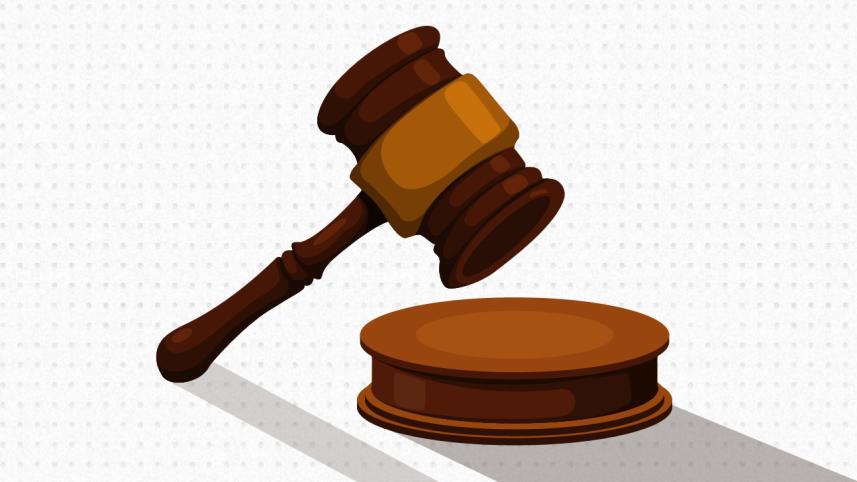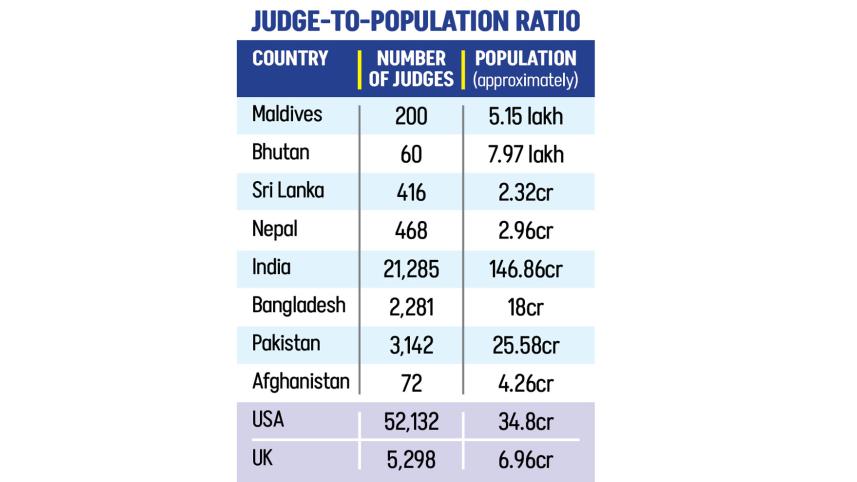Courts grapple with shortage of judges

With one judge for every 78,023 people, the Supreme Court and lower courts have been grappling with a growing backlog of cases, delaying legal remedies for thousands of justice seekers.
Bangladesh currently has one of the lowest judge-to-population ratios in South Asia -- 2,307 judges for 18 crore people.

In India, there is one judge for every 68,775 citizens, while Pakistan has one judge for every 81,417, according to Law Lab, which conducts research on legal, constitutional, and human rights issues.
Nepal has one judge for every 63,000 citizens, and Sri Lanka one for every 55,000.
The Maldives has the highest ratio with one judge for every 4,977 people, followed by Bhutan with one judge for 13,278. Afghanistan ranks lowest, with one judge for every 592,361 people, shows Law Lab data.
Overall, most South Asian nations lag far behind developed countries. For example, the USA has one judge for every 6,667 people and the UK one judge for every 13,140.
In Bangladesh, the shortage of judges has resulted in a backlog of 46.52 lakh cases, causing frustration among litigants and lawyers.
According to a SC report, each judge is now burdened with an average of 2,016 cases.
The Appellate Division has only seven judges, who are dealing with a total of 37,000 cases.
Recently, 25 judges were appointed to the High Court Division of the SC, raising the number of HC judges to 113.
However, among them, three are on leave and five have been kept away from judicial functions since October 16 last year following student-led protests on the SC premises, demanding removal of "pro-Awami League fascist judges", said SC sources.
"The huge backlog of cases in the Appellate and HC Divisions makes it very tough to get dates for hearing even for urgent cases," said SC lawyer Saqeb Mahbub.
"While recruitment of judges is an inevitable solution to the problem, its impact will be visible in the long term. The sufferings are likely to continue in the short term," he said, adding that the newly appointed HC judges are yet to preside over benches.
The Judiciary Reform Commission has suggested raising the number of lower court judges to at least 6,000 from around 2,000 to bring the backlog of cases to a manageable level.
When contacted, Md Muajjem Hussain, spokesperson for the SC, said steps have been taken to address the shortage of judges at courts.
More judges will soon be appointed to lower courts through Bangladesh Judicial Service Commission (BJSC).
Besides, the chief justice has formed 13 monitoring committees comprising HC judges to keep the backlog of cases at a manageable level, he said.
Requesting anonymity, a law ministry official said the process of appointing around 100 lower court judges is at the final stage.
This correspondent called Law Adviser Asif Nazrul on his mobile phone several times and also sent a message but received no response.
THE WAY FORWARD
SC lawyer Mohammad Shishir Manir, who leads Law Lab, said, "At least 1,000 judges should be appointed within the next few months both in higher and lower courts.
"The judiciary needs efficient judges who can dispose of cases quickly," he added.
Saqeb Mahbub suggested the introduction of a centralised management system that prioritises cases based on urgency and enforces strict time limits for hearings.
The cases deemed "non-urgent" may be put on the backburner, he added.




 For all latest news, follow The Daily Star's Google News channel.
For all latest news, follow The Daily Star's Google News channel.
Comments